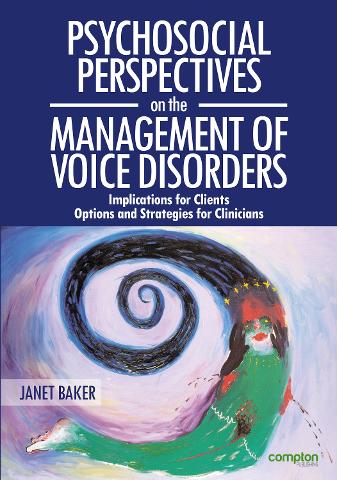Psychosocial Perspectives on the Management of Voice Disorders
Implications for Clients. Options and Strategies for Clinicians
Janet Baker
View sample chapters and author biographies here
‘This great book offers riches of the mind and heart to anyone working with the disturbed voice. Jan Baker's writing is comprehensive, erudite, original, accessible and eclectic. The book offers a thorough theoretical background, and clear ideas for working with clients who have a voice disorder; her approach superbly blends art and science with the humanity that joins them’. Christina Shewell, FRCSLT, Speech and Language Therapist; Theatre Voice Coach and Teacher; Honorary Lecturer, University College London; and author of Voice Work: Art and Science in Changing Voices.
‘This book represents a major contribution to the field of voice. It is special in its devotion to broadening our understanding of psychogenic voice disorders and the psychological skills and approaches required in their therapeutic management. Jan Baker has succeeded in giving us a rich and inspiring text that no voice practitioner, whether student, researcher or clinician, should be without.’ From the Foreword by Annie Elias, FRCSLT, Consultant Speech and Language Therapist in Voice and Author, Understanding and Treating Psychogenic Voice Disorder: A CBT Framework (with Peter Butcher and Lesley Cavalli)
‘Janet Baker inspires, challenges and clarifies. This unique and important book reflects the skill, experience, intellectual rigor and brave generosity of spirit, which have marked her career as therapist, teacher, mentor and academic. A gift to all practitioners involved in the care of individuals with voice disorders.’ Johanna Flavell, BA. BAppSc (Speech Pathology) Hons., Voice Consultant in private practice; Senior Speech Pathologist, Voice Analysis Clinic and Botox Clinic for Spasmodic Dysphonia, The Queen Elizabeth Hospital, Adelaide
Bringing to bear her extensive experience as a speech-language pathologist, with additional credentials in psychotherapy and family therapy, Jan Baker clearly, succinctly, and authoritatively presents clinical and empirical evidence for psychosocial factors related to the onset, aggravation, and outcomes of functional and organic voice disorders, and offers treatment strategies and approaches that are centred not only on traditional approaches to voice therapy, but also incorporate and demonstrate appropriate models of counselling.
A brief overview of several models of counselling and psychotherapy is given, with particular emphasis on the principles of systems theory and family therapy practice. Psychosocial factors that become evident during the different stages of voice therapy are discussed, including ways in which these issues may shape the therapeutic process and influence longer-term outcomes. These factors may occur, for instance, during the initial consultation and psychosocial interview; following assessment when explaining diagnostic findings; when clients ask searching questions about the ‘mind-body’ relationship; during therapy as sensitive information emerges; or towards the final stages of therapy when helping clients and families grieve over permanent changes to their voice or and an altered sense-of-self. They may become more pronounced in response to a client’s challenging behaviours, or as a reflection of problems in the therapeutic relationship. Strategies for speech-language pathologists to integrate appropriate counseling strategies in their voice work are proposed, with clinical vignettes to illustrate and support these approaches. These strategies are presented in a way that is in keeping with the professional scope of SLP practice, with criteria for recognizing the need for supervision, collaboration with other mental health professionals, or referring on.
Jan Baker’s book takes voice therapy for this challenging population into a new dimension; aside from its clear coverage of psychosocial factors and options for clinical treatment, the incorporation of counseling considerations and strategies gives speech pathologists and their clinical colleagues a powerful, holistic management tool.
